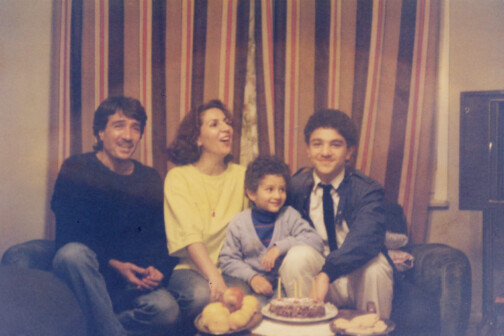From January 2023

Dallas County District Attorney John Creuzot has more than three decades of judicial experience, including 21 years as a felony district court judge. He was an early architect of using drug courts as a way to steer non-violent offenders into diversion programs, an approach so successful that former Gov. Rick Perry used it as a model for the state. He is on his second term as the county’s district attorney. D editor Tim Rogers asked him for lessons from some of his most memorable cases.
1. Show Compassion to the Father
When I was a prosecutor in the late ’80s, I did a death penalty case. This young man had shot and killed a store manager at an Oak Cliff Captain D’s restaurant. And he bragged about it. He got all the money and shot the guy anyway.
In a death penalty case, you have to prove that a person is a future danger to society, either outside or inside prison. That’s the law. And this young man had something like 27 felony offenses, including stabbings and shootings of his relatives. His mother got up on the stand and said that none of it was true. She didn’t back down one bit, doing whatever she could to save her son’s life.
Then the father took the stand. It was immediately apparent who ran that family, and it wasn’t him. So rather than going over all of that stuff, I changed my tactic with him.
I asked him about every time his son had gone to jail. Did he go see him or talk to him on the phone? He said yes.
I said, “Every single time, did he promise you that he wouldn’t do it again?” He said yes.
I said, “Did you believe him?” He said yes.
But the most important part of this was that I was standing next to him as I asked him these questions, and he was such a kind gentleman that I held his hand while I was talking to him.
I went through all these horrible things that his son had done and all the promises he had made and all the promises he had broken. And the last question I asked him was this. I said, “Sir, look across this courtroom for a moment and just look at everybody in here.” He did. I said, “Is there anyone in here who knows your son better than you?” He said no.
I said, “I want you to tell the jury. Do you have any idea when your son is going to stop this behavior either inside a jail or outside of jail? Can you tell them that?”
He hung his head and said, “I cannot.”
That was a powerful moment in that trial. He told the truth.
I said, “Pass the witness.”
The father one day called me out of the blue, maybe three years later. He wanted to know if he could get his son’s clothes back from the trial, and so we had a conversation. I asked him how his son was doing. He said he was in administrative segregation. I said, “For what?” He had tried to stab somebody in the penitentiary. It was just proof positive that his answer in court had been accurate.
This was an adverse witness, but there was no reason not to show him empathy. He wasn’t my enemy. I didn’t have to fuss with him. I just had to hold his hand and ask him to tell the truth.
“ I didn’t have to fuss with him. I just had to hold his hand and ask him to tell the truth.”
2. Jingle the Dead Woman’s Keys
It’s rare for a district attorney in a big city like Dallas to personally prosecute a case. But after the first murder trial of Bill Chemirmir, in November 2021, ended with a hung jury, I told the lead prosecutor that I would ride second chair for the next trial. This was the man accused of suffocating 22 elderly women in assisted living facilities and their homes so that he could steal their belongings. I read through the transcript of the first trial and saw some things that I thought we could do better.
From the evidence, we knew in this case that Chemirmir followed the victim home. We tracked his phone to her house. And he was arrested in Plano with some of her items in his hands, including a set of keys. While she was still lying dead in her Dallas house, Plano police took those keys to Dallas and found that they opened the woman’s door. That pulled it all together.
At the first trial, our prosecutors showed the jury a picture of those keys fitting in the locks. But you have to think about those jurors. They have to sit through a long trial and listen to a lot. They are passive. They don’t get to do anything, ask any questions. Sometimes they lose track of what is happening. Their attention wanders. Sometimes they appear to doze off.
So for the next trial, I said to my prosecutor, “You put those keys in your hand. Jingle those keys in front of the jury, and make certain that they understand these keys are real keys. They were her keys, and they fit in her door.” We wanted to make those keys, that important piece of evidence, more impactful.
In two trials after that hung jury, two juries have found him guilty of capital murder in separate cases. Dallas County has dismissed the remainder of cases against Chemirmir, but he still faces several cases in Collin County.

3. Watch the Handwriting
In the early ’90s, a Highland Park man was accused of poisoning his wife with arsenic, among other chemicals. I was the judge in the trial. They were both landscape architects. The theory was that he’d killed her because she had a big life insurance policy. But her doctors thought she’d died from toxic shock syndrome and not any sort of poisoning. The medical examiner found that the wife’s body had hugely elevated levels of arsenic, but the husband had two defenses: first, it was common in his industry to kill fire ants with it. He claimed there was nothing unusual about him buying arsenic. Second, the couple had been estranged, and his defense attorney showed that the wife herself had receipts for buying arsenic. They said she’d sickened herself to get the husband’s attention.
Her family, though, kept insisting that he’d poisoned her. One of the things I remember was that the couple had gone to a movie, and he’d bought her a drink at the concession counter and brought it to her. She’d said that the drink had a powder-like substance in it, and she’d spit it out. But there wasn’t any direct proof that he’d poisoned her.
But then the husband’s defense team presented a receipt from a place that had supposedly sold the wife arsenic. So at trial, the prosecution asked the man, “Do you sell arsenic?” The man said, “Yes, I do.” The prosecution said, “Do you know the defendant?” He said he did. The prosecution showed him the receipt that the husband’s defense team had presented as evidence that the wife had bought the arsenic that she’d used to sicken herself. The prosecution said, “Is this your receipt?”
And the guy says, “That’s on my paper, but that’s not a receipt from me.” He got kind of cocky. He said, “I have beautiful handwriting. I take pride in my handwriting. That receipt is machine-printed, and I don’t machine-print my receipts. That’s a fake.”
The husband was convicted and given a life sentence.
Another thing that blew that case open was that, subsequent to the wife’s death, the housekeeper said that she’d had a conversation with the husband and told him that his wife had changed the beneficiary of her life insurance policy. He was stunned and shocked.
4. Don’t Be Afraid to Call Your Detractors
There was a University Park man in 1991 who had been committed to a mental institution over a dozen times. He had been seen walking through the neighborhood in an agitated state with a rifle in his hand. Nobody did a thing.
And one night, one of our former judges got this loud knock at the door. He knew the man, and he knew he was mentally ill. The man was claiming that somebody was trying to kill President Bush and his son and the judge. For reasons I can’t explain, the judge opened the door and let the man in the house with the rifle. But then he couldn’t get him out of the house.
So he called the police, and it was an open line. I was the judge in this case. We actually had a recording of all of this going on. The man was in a manic state. The judge finally talked him out of the house, talked him into going to the front yard and protecting the house. And who comes driving down the street but the Dallas Morning News delivery woman. The man shot and killed her.
He was charged with murder, and the case was assigned to my court. Obviously, the defense was insanity. This was before my first election as District Judge, in 1992, and the question was asked of me: “This is a political year, and you’re running as a Democrat in a Republican County. What if we want a judge trial, not a jury trial? Will you hear the case?” I said, “Absolutely. I don’t care.” I was supposed to lose the election anyway. I told the two sides that I would listen to the evidence and make the best decision.
The shooter came from a wealthy family and had a trust, so he got to leave the Dallas County jail for treatment at the Terrell State Hospital. And he was successfully treated and became stable.
So we brought him back for the trial. The state told me that they had two or three witnesses who said he was insane at the time of the killing; no witnesses could say he was sane. So I found him not guilty by reason of insanity, but I was required by law to send him back to the mental institution for an evaluation, and when I brought him back, the state again told me they didn’t have any witness who would testify that the man needed to be incarcerated for the safety of the community. I ruled that he could be safely treated in the community.
The next day, the newspaper headline said “Judge Frees Killer.” The district attorney at the time, my political opponent, John Vance, told the media what an awful, horrible thing I’d done as judge. Mind you, his staff had already told me there was no evidence that this man should be incarcerated or that he needed to be hospitalized. I’m looking at the facts and the law.
OK, so then I got a letter from a doctor. I don’t remember his name. And he told me what an awful thing I had done. Horrible. And he says he will personally see to it that I don’t get re-elected to District Judge; he’s going to spend all this money to make sure I’m defeated.
I actually called him. I told his office who I was and that he had written me a letter, and I asked if I could speak to him. He sheepishly came on the phone.
I said, “I got your letter. May I spend a few minutes talking to you about this? I want to ask you, as a medical doctor, do you often give people medical advice that they don’t follow at their own peril?” He said, “Of course.”
I said, “I’m going to read this newspaper story to you. Forget the headline. I’m going to read the story.” And I read the story. I said, “Now, I’ve gotten medical advice from these doctors who have treated this man. It’s the best medical advice I have. And that’s the only advice I have.” I said, “I want you to tell me whether I should accept this medical advice—or ignore it, perhaps at my own peril.”
He hesitated, and he said, “I want to apologize for the letter. I was wrong.”
I told him that if he wanted a judge who did things for political convenience, I wasn’t his guy. Out of 575,515 votes cast in that 1992 election, I won by 333.
This story originally appeared in the January issue of D Magazine with the headline, “Jingle the Dead Woman’s Keys.” Write to [email protected]





